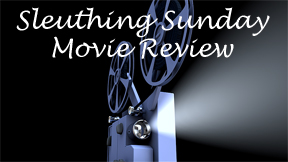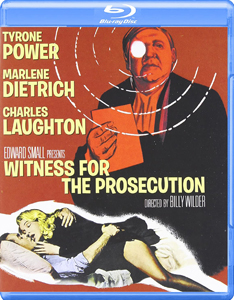“Witness for the Prosecution” (1957) regularly ranks as one of the great Agatha Christie adaptations, but it’s admirable for its basic ability to tell a story more so than anything spectacular. It started as a 1925 short story (originally called “Traitor’s Hands”), then Christie expanded it into a 1952 play, then it earned household status with this Oscar-lauded adaptation by director/co-writer Billy Wilder.
Enthralling drama
It’s famous for its twist ending, onto which Christie adds an additional key moment in the play and film. But, illustrating how good “Witness” is at its core, I wasn’t thinking entirely about that forthcoming twist (which I knew from the short story) while watching. I was enthralled with the courtroom drama.
“Witness” starts slow, with Charles Laughton and Elsa Lanchester – as cardiac case lawyer Robarts and private nurse Miss Plimsoll — doing a running comedy skit at his law office. Robarts looks like Boss Nass from “The Phantom Menace.” While he’s often blustery – to the point where his jabs at the well-meaning Plimsoll teeter from funny to mean — he’s also a brilliant barrister.

“Witness for the Prosecution” (1957)
Director: Billy Wilder
Writers: Billy Wilder, Harry Kurnitz (screenplay); Agatha Christie (play and short story)
Stars: Tyrone Power, Marlene Dietrich, Charles Laughton
Leonard Vole (Tyrone Power) comes to him in desperation; he’s buried in circumstantial evidence despite being innocent of murdering a rich older woman. Robarts can’t resist forgoing his mandated naps and taking this case, which at one point he thinks will be his last.
Once Vole tells his story – which further unspools into the courtroom – the propulsive forward movement doesn’t relent.
A poke at the system
Meanwhile, Wilder – via Christie – mildly but consistently makes fun of the English justice system. This isn’t entirely intentional, but the pomp and circumstance play like a pointed critique when watched by a modern American viewer.
The lawyers and judges wear wigs, the defendant (always called “the prisoner”) sits in a box with two guards staring him down from either side, and the general layout of the room is bizarre compared to what we’re used to from “Law & Order.”
“Witness” pokes fun at trails-as-entertainment via a woman sitting next to Plimsoll. She’s emotionally invested in each twist and turn. Like many films have done since, this one finds there’s room for both comedy and drama in a courtroom murder-case story, and Wilder perfectly calibrates the balance.
Always pre-sprayed with “sweat” in the courtroom, Power is someone we want to root for. Setting aside whether he’s guilty or innocent, the psychological pressure the system places on Vole is heavy and cruel enough that we root for the underdog.

A strong gallery
Laughton carries the show as he’s supposed to, especially once Robarts gets past abusing his nurse and moves into trying to free an innocent man.
Marlene Dietrich plays German ice queen Christine, Vole’s wife. We get relief from the case via a flashback to their meeting when Allied forces occupied Germany in 1945. Here the film drifts into old-movie bombast as Leonard rescues Christine – an accordion player – from a rowdy room of drunken soldiers who aren’t happy with her conservative attire.
A great supporting turn comes from Una O’Connor as Janet, the hearing-impaired housekeeper of the woman Vole is accused of murdering. Very much a classic Christie character, Janet says what’s on her mind, going off on tangents and amusing the whole courtroom from the witness box. “Witness” throws in a critique of socialized health care of the time, as Janet has been waiting for six months for a hearing aid.
“Witness for the Prosecution” is a nice document of how Christie views English courts (she thinks they are amusing and fair game for critique) and also crime-and-punishment (she doesn’t like murderers to go free). It’s also a time capsule of English courtrooms at midcentury. But most of all it’s a darn good story where we hang on every twist – not merely the last one.
IMDb Top 250 trivia
- “Witness for the Prosecution” ranks No. 63 among IMDb’s Top 250 movies with an 8.4 rating.
- 1957 was a good year for courtroom dramas. IMDb’s top-ranked court film (“12 Angry Men” at No. 5) was also released that year.
- This is the highest-ranked Christie adaptation. Up next among English-language productions is 1945’s “And Then There Were None.”
Every week, Sleuthing Sunday reviews an Agatha Christie book or adaptation. Click here to visit our Agatha Christie Zone.

